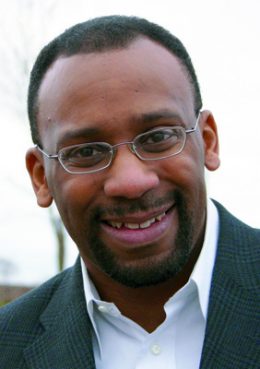
(RNS4-FEB21) Edward Gilbreath is an editor at large at Christianity Today magazine and editor of
Today’s Christian magazine. His new book is “Reconciliation Blues: A Black Evangelical’s Inside
View of White Christianity.” For use with RNS-10-MINUTES, transmitted Feb. 21, 2007. Religion
News Service photo courtesy of InterVarsity Press.
(UNDATED) A Presbyterian Church (USA) conference center about 40 miles north of New York City is gearing up to become headquarters for a new ecumenical community that will feature vows of nonviolence and a first-of-its-kind laboratory for interfaith peacemaking.
Both are key to the vision of Rick Ufford-Chase, co-director of Stony Point Conference Center in Stony Point, N.Y. He says he and his co-director wife, Kitty, aim to refashion the 60-year-old center into something of an “Iona on the Hudson,” a reference to the famed Scottish Christian community committed to peace, social justice and exploring new ways of living the Gospel.
Ufford-Chase spoke by phone from his Stony Point office. Some answers have been edited for length and clarity.
Q: What are you planning that will be new for Stony Point Center?
A: Groups will continue to come here for retreat and conferences. But the conference center will be grounded by two overlapping communities. The first will be a Christian community committed to non-violence and justice, a kind of ecumenical religious order whose people are committed to the principles of Jesus and to non-violence. The second will be what we’re calling, “The Community of Living Traditions” that will features three houses — Muslim, Jewish and Christian — that will house young adults.
Q: Members of the ecumenical community will take five vows. What kind of vows?
A: One is deep spiritual practice and discipline — things like Sabbath keeping, daily prayer, regular fasting and regular worship. A second will be to include in each member’s vocation some kind of active work for non-violence. A third is making holy those things which sustain us, such commitments around environmental concerns and standing against consumerism. A fourth is a strong commitment to interfaith partnership. The fifth is a commitment to radical hospitality — to open our doors to people who are different from us, to ask people of privilege to place themselves in situations that may be discomforting to them.
Q: Would each local community decide how to interpret these principles? Or would there be some sort of normative standard across the country?
A: I would expect there would be some kind of a normative standard or challenge to our members. But part of the reason for this is to take people wherever they are in society and to help them move in the direction of greater faithfulness. Each person’s covenant will be a little different, depending on where they begin and what their life situation is.
Q: Who will comprise The Community of Living Traditions in your three houses on campus?
A: The Jewish community is a group called Shomer Shalom, which means “keeping peace.” It’s recently formed, about a year ago, and is fully committed to nonviolence. The Muslim Peace Fellowship has been around since 1994 and is fully committed to nonviolence because of what they believe as Muslims. The Christian community, which I’ve been describing as a national network, will have — as one piece of what they do — a young adult house. It will be a sister house to the Jewish and Muslim houses.
Q: What will happen inside these residential communities?
A: We are looking for young adults who are deeply committed to the religious or spiritual practices that most embody their own traditions. So the Jewish house, we expect, will practice Shabbat on Friday night and Saturday morning. Each member of the Muslim community will practice daily prayer, five times a day, and come together for prayer on Fridays at noon. Christians will practice daily prayer each morning.
Q: How will these houses interact or advance a vision that others will see?
A: We’re hoping each of these young adults, about a dozen in all, will be a full-time volunteer for a year. Half of their time will be dedicated to hosting the conference work that goes on here; the other half would be given over to their common work and doing outreach to the community around us. The uniting project that will hold everybody together is a year-long course, for two or three days a month, to become certified in interfaith non-violence work.
Q: In the big picture, do all these elements come together to address some kind of societal deficit?
A: We’ve got hard work to do, given the increasing spiral of violence in our world today and the ways in which all of us are participants in it. You can’t escape being a participant in it at some level. Christians, Muslims and Jews have hard work to do together.




